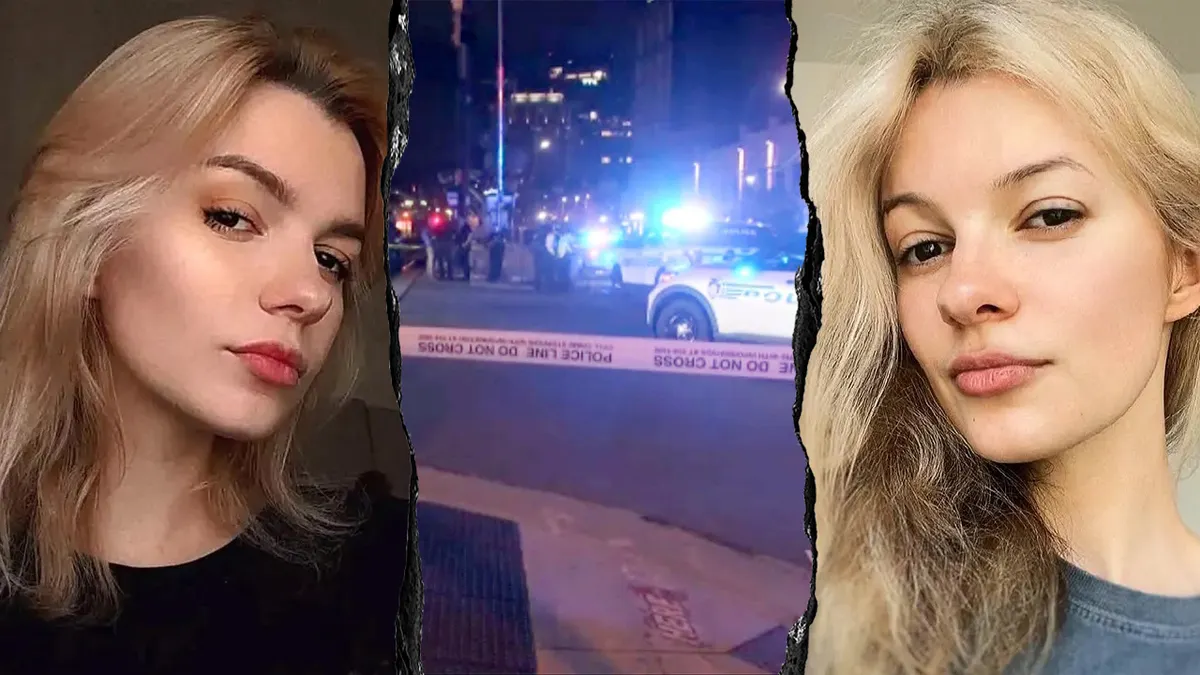In a heartbreaking and powerful first public statement, the family of Iryna Zarutska, a 23-year-old Ukrainian refugee who was brutally murdered on a Charlotte light rail train last month, has released a handwritten letter that lays bare their devastation—and demands change.
The emotional three-page letter, described by sources close to the family as written in shaky handwriting by Iryna’s mother, Anna, comes amid growing public outrage over the violent incident that claimed her daughter’s life. The document, partially scanned and selectively shared through the family’s legal representatives, is raw, direct, and deeply personal. Most striking, however, is the final page, where several lines have been deliberately blacked out with thick ink, sparking widespread speculation over what was left unsaid.
“She Fled War to Find Peace—And Was Met With Violence”
The letter begins with a gut-wrenching expression of grief:
“Our hearts are shattered into pieces that can never be mended. Iryna fled the bombs and destruction of our homeland, seeking the promise of America—a place of safety and new beginnings. Instead, she was taken from us in the most senseless, horrific way imaginable.”
Written from Ukraine, where Anna remains trapped by war and unable to travel due to both the conflict and her own deteriorating health, the letter captures a mother’s raw agony. The uneven handwriting—painfully etched—reveals a family in emotional collapse, still struggling to understand the cruelty of their loss.
A Life Full of Hope, Cut Short
Over three pages, the letter paints a picture of a young woman filled with optimism and resilience. Born near Kyiv, Iryna had recently graduated university and moved to Charlotte to begin a new life. She volunteered at senior centers, worked double shifts at a local pizzeria, and was saving for a car. She had a driver’s license test scheduled for October—a milestone that symbolized her independence in a new country.
“She texted her boyfriend that night, ‘I’ll be home soon.’ Ten minutes from her stop, her light was extinguished,” the letter recounts. “We tracked her phone to the station and arrived to learn she was gone—stabbed, alone, on a train meant to carry her safely home.”
The family made the decision to bury Iryna in North Carolina rather than return her body to Ukraine, calling America “the land she loved most.”
The Redacted Passage: A Mystery Within the Grief
The final page of the letter contains a blacked-out section—multiple lines obscured with ink, a visual that has ignited online speculation.
Family attorney Michael Smith, speaking under condition of anonymity, confirmed the redaction was intentional, citing “sensitive family matters and broader systemic criticisms that the family is not ready to make public.”
Theories surrounding the hidden text range from allegations of withheld evidence to potential threats, or even diplomatic concerns involving the family’s safety back in Ukraine.

The Killing: A City Shaken
On August 22, 2025, just after 10 p.m., Zarutska boarded the Lynx Blue Line at Scaleybark Station after work. Surveillance footage shows 34-year-old Decarlos Dejuan Brown Jr. sitting behind her. Without warning, he stood, pulled a knife, and attacked—slashing her neck and torso multiple times before calmly exiting the train.
Passengers, stunned and frozen, failed to intervene. Iryna bled out in her seat, pronounced dead at the scene by first responders.
Brown, a Charlotte resident with 14 prior arrests over 12 years, including robbery, assault, and mental health incidents, had been recently released from jail just weeks prior. He now faces state murder charges and federal charges for causing a death on public transportation. A judge has ordered a 60-day psychiatric evaluation—a ruling that itself contains redacted portions.
A Nation Reacts—And Splits
The Zarutska family’s letter has further fueled national debate about public safety, mental health, and immigration.
On social media, hashtags like #JusticeForIryna and #IrynaZarutska have trended, with conservative commentators blaming “soft-on-crime” policies in Democrat-led cities. Former President Donald Trump has even weighed in, calling for the death penalty for Brown and promising tougher urban crime enforcement if reelected.
Progressive voices, while acknowledging the tragedy, highlight systemic failures in mental health care access. But the Zarutska family is clear in their stance:
“His history of violence speaks for itself. Compassion cannot come at the cost of safety. He must remain behind bars forever. No more chances at the expense of innocent lives.”
Was the System to Blame?
The redacted section of the letter is widely believed to criticize Charlotte’s transit system (CATS) for security lapses. Reports of poor lighting, infrequent patrols, and delayed emergency response times have added fuel to public outrage. Some speculate the family may be considering legal action against the city.
Iryna’s uncle, speaking to ABC News, was blunt:
“She escaped Russian bombs, only to die on a train in a so-called sanctuary city.”
Legacy of a Dreamer
Friends describe Iryna as kind, artistic, and hopeful. She loved animals, made sketches of landscapes and dogs, and was “head over heels for the American Dream.” Her boyfriend shared her last text messages—simple words of love and anticipation—that now haunt him.
Vigils continue in Charlotte. Community members gather with candles at the station where she died. Churches have offered prayers. Her family, despite unimaginable grief, is turning pain into purpose.
“We demand change,” the letter ends—just before the inked-out section.
Final Word
In a time when headlines come and go, Iryna Zarutska’s story endures—a refugee who sought peace and found violence, a daughter silenced far from home, a family pleading through redacted ink for truth, safety, and justice.
“No more victims. No more failures,” the family’s letter insists.
And now, the world watches—waiting for that ink to fade, and for justice to speak.




